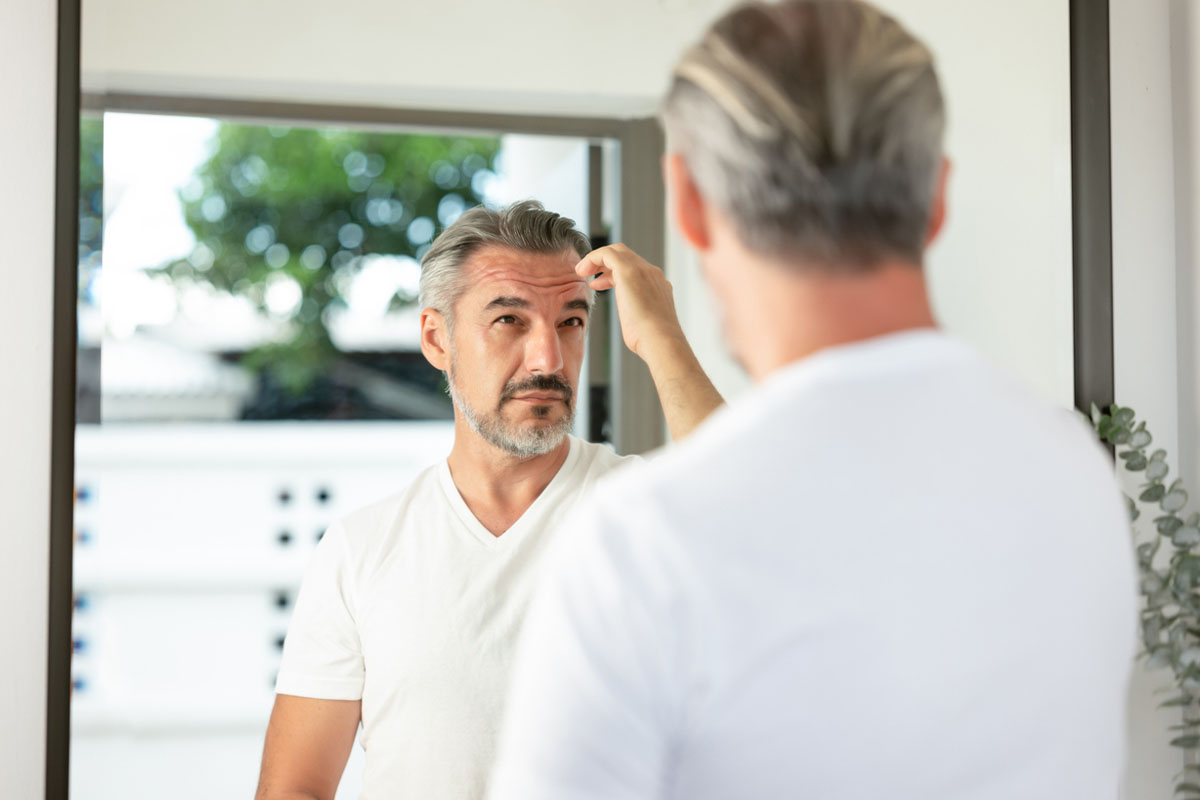That sinking feeling when you see more hair in the drain than on your head — it’s all too familiar for many men. And when those strands start disappearing, it’s easy to grasp at straws, searching for answers. Low testosterone, the hormone that fuels so much of your masculine vitality, often takes the blame. But the truth about hair loss and testosterone isn’t a simple equation.
Here’s the spoiler: low testosterone itself isn’t the direct culprit behind your receding hairline. But don’t tune out just yet. Understanding the nuances of this relationship could be the key to unlocking a fuller head of hair.
Testosterone and Hair Loss
While testosterone is essential for men’s health, it’s not the hormone itself that directly causes hair loss on the scalp. The real culprit is a byproduct of testosterone called dihydrotestosterone (DHT).
DHT is created when testosterone interacts with an enzyme called 5α-reductase. It’s a more potent form of testosterone that can bind to receptors in hair follicles, triggering a cascade of events that lead to hair loss. Specifically, DHT can shrink hair follicles, shorten the hair growth cycle, and even cause follicles to stop producing hair altogether. This process is known as miniaturization and is a hallmark of male pattern baldness.
Interestingly, research hasn’t found a direct link between low testosterone levels and hair loss.
Instead, it appears that the concentration of DHT in the scalp—and the activity of 5α-reductase—as well as the sensitivity of hair follicles to DHT are more significant factors.

What Does the Latest Research Say?
While it’s tempting to blame low testosterone for hair loss, the science paints a more nuanced picture. A 2017 study investigating the link between testosterone deficiency (TD) and various health issues in aging men found a correlation between TD and decreased libido, erectile dysfunction, and increased body fat. However, the connection to hair loss was less clear-cut.
This research suggests that hair loss might be more closely tied to other factors, such as:
- DHT Levels: The amount of DHT present in the scalp, which can be influenced by both testosterone levels and the activity of the 5α-reductase enzyme.
- Follicle Sensitivity: The individual sensitivity of hair follicles to DHT, which can vary greatly from person to person due to genetic and other factors.
- Additional Factors: Other factors like age, genetics, stress, and overall health can also contribute to hair loss.
While low testosterone levels may play a role in hair loss for some individuals, it’s not the sole or even primary factor. In fact, your susceptibility to male pattern baldness is largely determined at birth. However, it’s not just your genes that are at play. The interplay of hormones, enzymes, and individual factors also contribute to the complex puzzle of hair loss.
If It’s Not Testosterone, Then What Causes Hair Loss?
Hair loss is rarely a simple equation with a single cause; it’s often a combination of genetic, hormonal, and environmental influences.
Here’s a breakdown of the common culprits:
Genetics
Your genes play a significant role in determining your susceptibility to hair loss, particularly male pattern baldness. If your family has a history of hair loss, you may be more likely to experience it yourself.
DHT Sensitivity
While low testosterone itself doesn’t directly cause hair loss, its conversion to dihydrotestosterone (DHT) can be a major factor. If your hair follicles are highly sensitive to DHT, you may experience hair loss even with normal testosterone levels. This sensitivity is often influenced by genetics.
Age
As men age, hair loss becomes more common due to a combination of hormonal changes, genetic predisposition, and other factors

Medical Conditions
Certain underlying medical conditions, such as thyroid disorders, alopecia areata (an autoimmune condition), and scalp infections, can trigger or exacerbate hair loss.
Medications
Some medications used to treat various conditions, including cancer, depression, high blood pressure, and heart problems, may have hair loss as a side effect.
Stress
Significant or prolonged stress can disrupt the normal hair growth cycle and lead to a type of hair loss called telogen effluvium.
Hairstyling and Treatments
Tight hairstyles, harsh chemical treatments, and excessive heat styling can damage hair follicles and lead to breakage.
The factors that contribute to hair loss are as unique as you are. Before you start blaming your testosterone levels or questioning your treatments, take a look at the men in your family.
Everyone reacts differently to treatments, including testosterone replacement therapy (TRT). If you’re concerned about hair loss while on TRT, don’t hesitate to talk to your doctor about adjusting your dosage. The best health clinics regularly monitor your T levels to ensure they’re optimized for your individual needs and goals, including hair health.
Worried About Hair Loss? Here’s What to Do
If you’re starting to notice hair loss, there are several popular and evidence-backed treatments you can explore before consulting a doctor:
Minoxidil (Rogaine)
This over-the-counter medication is applied topically to the scalp and can help slow down hair loss and even promote regrowth in some cases. It’s available in both liquid and foam forms.
Finasteride (Propecia)
This prescription medication is taken orally and is designed specifically for men with male pattern baldness. It works by blocking the conversion of testosterone to DHT, the hormone primarily responsible for hair loss in this condition.

Low-Level Laser Therapy (LLLT)
This non-invasive treatment uses red light to stimulate hair follicles and encourage growth. It’s available in various forms, including combs, helmets, and caps.
Lifestyle Changes
Certain lifestyle modifications, such as eating a balanced diet rich in nutrients like iron and zinc, managing stress, and avoiding harsh hair treatments, can also contribute to healthier hair.
Supplements
While research is ongoing, some supplements like biotin and saw palmetto are thought to potentially support hair health. However, it’s important to talk to your doctor before starting any new supplements.
See a doctor for personalized guidance
Hair loss can have various causes, and what works for one person may not work for another. A medical professional can help diagnose the root issue and create a treatment plan tailored to your specific needs.
Hair loss is a stubborn beast, and what works for your buddy might not work for you. If you’re serious about tackling your thinning thatch, it’s time to call in the pros.
A medical professional can give you the lowdown on what’s really causing your hair loss, not just guesswork. They can arrange a personalized treatment plan that’s tailored to your unique situation. And trust us, that’s way more effective than blindly trying random products or supplements.
Your Path to Optimal Health Starts Here
At Yunique Medical, we get it – we know that your hair is part of your identity, your confidence, and your overall well-being.
That’s why we take a holistic, no-nonsense approach to men’s health, including hair loss. We don’t just slap a band-aid on the problem. We dive deep into your unique biology, looking at everything from your genetics and hormone levels to your lifestyle and medical history. This helps us pinpoint the real reasons behind your hair loss, so we can create a personalized game plan that actually works.
Whether it’s through hormone optimization, dialing in your diet, or exploring cutting-edge therapies, we’re all about finding solutions that fit your life and your goals. We’re not here to sell you a one-size-fits-all solution; we’re here to help you take back control of your hair and your health.
Schedule a consultation with Yunique Medical today and let’s get this hair journey started.

